Open data is the highest level of data sharing, as it is freely available and accessible to all. Properly processed and with full respect for the protection of personal data, it can help citizens, businesses and the public sector to make better decisions.
Open data, together with other data, play a key role in the creation of data spaces, as referred to in the European Data Strategy. As stated in the document, the implementation of common and interoperable data spaces in strategic sectors is set up with the aim of "overcoming technical and legal barriers to data sharing between organisations, combining the necessary tools and infrastructures and addressing trust issues", for example through common standards developed for the space.
In view of its relevance, the European Data Portal Academy has organised a series of webinars on data spaces. The first of these was held on 12 May in an online format and can be viewed here. In it, the new developments and progress being made regarding data spaces were mentioned, developments that in Spain are being carried out by the Data Office.
We summarise below the main aspects addressed in this first seminar, in which Daniele Rizzi, Principal administrator and policy officer and Johan Bodenkamp, Policy and project officer at the Directorate General for Communication Networks, Content and Technologies of the European Commission, participated, with the moderation of Giulia Carsaniga, Research and Policy Lead Consultant at Capgemini.
Data spaces and the EU's digital strategy
The first part of the seminar, which was held online, highlighted how digital transformation is one of the European Union's top priorities. In fact, Europe has a specific strategy to advance in this aspect, i.e. to achieve 'A Europe fit for the digital age', and it is one of the six 2019-24 priorities of the European Commission.
The European Union's digital strategy aims to make digital transformation benefit people and businesses, a context in which the European Data Strategy of February 2020 is framed, which includes a series of measures for the promotion of a European data market, similar to the European Common Market, the seed of the current EU.
The creation of this European data market requires the establishment of a series of actions and standards with a focus on data, technology and infrastructure. A collective effort, including public programmes such as DIGITAL Europe and private programmes such as Gaia-X, is also contributing to this.
One year after the approval of the European Data Strategy, the European Council acknowledged in March 2021 "the need to accelerate the creation of common data spaces and ensure access and interoperability of data" and invited the Commission to "present the progress made and the remaining measures necessary to establish the sectoral data spaces announced in the European Data Strategy of February 2020." Subsequently, in February 2022, the European Commission published a working document on the European data market.
After contextualizing the development of the concept of data spaces within the European framework, the webinar presenters went on to explain the key components that will be part of the data spaces, some of which are already operational and others are still in development. The seminar provided an overview of what the European data space is expected to be like, highlighting the following aspects:
Firstly, there was a discussion about high-value datasets from the public sector. In January of this year, the European Commission published a list of high-value datasets, which are understood as those that provide added value and significant benefits to society. There is a wide variety of high-value data in different areas (health, agriculture, mobility, energy, etc.) that stakeholders make available with varying degrees of openness. As explained in the webinar, the idea is to start creating common high-value data spaces in more homogeneous areas, although the ultimate goal is for data to be shared across all sectors within the European market, as most applications will require data from different domains.
To support the creation of these data spaces, the first initiative launched in Europe is the establishment of the Data Spaces Support Centre. This center explores the needs of data space initiatives, defines common requirements, establishes best practices to accelerate the formation of sovereign data spaces as a crucial element of digital transformation in all areas, and ensures interoperability through compliance with common standards.
In order for all of this to be developed, a technical infrastructure for data spaces is necessary, which facilitates cloud and edge-cloud services, intelligent middleware solutions (Simpl), a digital marketplace, high-performance computing, on-demand artificial intelligence platform, and AI testing and experimentation facilities.
Differences and similarities between data spaces and datalakes
After providing an overview of data spaces in Europe, the seminar addressed their main characteristics. In this regard, a data space was presented as a secure and privacy-respecting IT infrastructure for aggregating, accessing, processing, using, and sharing data. It was also defined as a data governance mechanism that comprises a set of administrative and contractual rules that determine the rights of access, processing, use, and sharing of data in a reliable, transparent, and compliant manner with applicable legislation.
One of the features highlighted in the webinar regarding this type of infrastructure is that data owners have control over who can access which data, for what purpose, and under what conditions they can be used. Additionally, there is a large amount of voluntarily available data that can be reused either for free or in exchange for compensation, depending on the decisions of the data owners.
Furthermore, it was emphasized that data spaces involve the participation of an open number of organizations/individuals, respecting competition rules and ensuring non-discriminatory access for all participants.
Another concept discussed in the seminar was that of datalakes, in comparison to data spaces. Datalakes were defined as repositories that allow storing structured and unstructured data at any scale. In a datalake, as explained in the seminar, data can be stored as is, without the need for prior structuring, and different types of analyses can be performed, ranging from dashboards and visualizations to real-time data processing and machine learning for more informed decision-making. Accessing the datalake implies the possibility of accessing all the contained data, not necessarily in an organized manner.
On the other hand, a data space, according to the presenters, can be defined as a federated data ecosystem based on shared policies and rules. Users of data spaces have the ability to securely, transparently, reliably, easily, and uniformly access data. In a data space, data owners have control over the access and use of their data. From a technical perspective, a data space can be seen as a data integration concept that does not require common database schemas or physical data integration but is based on distributed and integrated data stores as needed.
Using a fishing analogy, in a datalake, the user has to catch the fish themselves, while a data space would be like going to a fish market.
Next steps: Governance framework and European actors
Once the difference between dataspaces and datalakes was presented, the webinar addressed the paradigm shift in data sharing that is currently taking place. Until now, bilateral data exchange based on contractual agreements has been common. However, a new model of data exchange infrastructure with centralized data hosting and/or data markets is gaining momentum, which reduces transaction costs when data is not maintained in a central repository.
According to the presenters, the next step in the evolution of data spaces would be the creation of links between participants in a model where data is federated and stored in a distributed manner, with tools that enable search, access, and analysis across multiple industries, companies, and entities.
To make this process happen, as explained by the presenters, the support and coordinated work of different actors are necessary. On one hand, it would be essential to establish common rules that facilitate data exchange and bring the different stakeholders closer to a common data policy in the EU. Similarly, providing technical solutions and financial support is indispensable.
In this regard, the webinar highlighted an important milestone: the establishment of the European Data Innovation Board (EDIB), which will support the Commission in publishing guidelines to facilitate the development of common European data spaces and identifying the necessary standards and interoperability requirements for data exchange.
As mentioned earlier, the implementation of data spaces requires technical architecture, and the webinar highlighted two free technical solutions:
-
Building Blocks: Open and reusable digital solutions based on standards that enable basic functionalities, such as reliable authentication and secure data exchange.
-
Simpl: The intelligent middleware that will enable cloud-based federations and edge-cloud. It will support major data initiatives funded by the European Commission, such as the common European data spaces.
The key role of the Data Spaces Support Centre
Towards the end of the seminar, the Data Spaces Support Centre (DSCC) initiative was presented in more detail. This center, established in October 2022, provides support to various initiatives in the creation of data spaces and is expected to conclude its activities in March 2026. It consists of twelve partners and also has sixteen collaborating partners, including important associations and companies with expertise in the field of data exchange.
The main mission of the DSCC is to create a network of partners and a community to provide tools for the creation of data spaces. It focuses particularly on interoperability and aims to generate synergies at the European level for the development of data spaces.
The webinar reviewed the collaborations and initiatives in which the Data Spaces Support Centre participates, and it was highlighted that the starter kit, a starting point for building data spaces, is available on its website.
In the final stretch of the seminar, an overview of the relevant actors in the European common data space was provided:
-
Data Spaces Support Centre (DSSC): Responsible for coordinating relevant actions in data spaces.
-
Data Space Coordination and Support Actions (CSAs): Focused on sectoral data spaces.
-
European Data Innovation Board: Starting from September 2023, it will be responsible for setting guidelines to achieve interoperability in data spaces.
If you want to know more about the concept of data spaces and their relevance today, you can watch the full seminar in the following video:
The following training material is now available on data.europa academy:
- The recording of the session;
- The slide deck presented during the webinar.
Just over a year ago - and after an extensive process of analysis, research and public consultation - the UK government announced its new national data strategy created in response to the increasingly important role of data in all aspects of our society. The strategy builds on other related initiatives such as the industrial strategy, the research and development roadmap, the artificial intelligence industry review and the framework agreement between the government and the artificial intelligence industry. As part of this process, five key opportunities have been identified where data could play a truly transformative role in the country: stimulating productivity and trade; supporting the creation of new businesses and jobs; increasing the speed, efficiency and scope of scientific knowledge; improving public policy and services; and contributing to the creation of a fairer society for all.
Such a data strategy is called to be part of the national digital strategy (still under development) and it is built as a whole on four structural pillars. These pillars correspond to the outstanding challenges identified during the analysis phase:
- The adoption of the basic fundamentals of data, understood as the identification of the data that are most suitable for a given purpose, and the fact that these are always stored in standard formats and in systems that allow their location, access, interoperability and reuse.
- The development of data capabilities, including a wide range of skills - both technical and managerial - ranging from the most generic and basic to more specific and advanced ones.
- Improvements in data access and availability, creating an environment that facilitates the flow and reuse of data across all public and private sectors while meeting the necessary security and privacy guarantees.
- Responsible use of data, securely, ethically and in compliance with all applicable legislation, but also allowing for its exploitation for research, development and innovation.
Based on these pillars, 5 priority action areas are developed as a central part of the strategy, the objective of which will be to respond to the identified barriers that could hinder the new opportunities existing in the data sector:
- Unlock the value of data in the economy, recognizing the general value of data as a new and thriving economic asset, but at the same time studying each individual case in search of the necessary balance between individual rights and common benefit.
- Maintain a data policy that is simultaneously pro-growth and pro-trust, so that it does not pose a barrier to entry for new innovators and can keep pace with the growth of new technologies. A regime through which companies manage data more transparently and individuals can make more informed decisions about their data.
- Transformation in the use of data by government, with the aim of improving the efficiency of public services. This would require the leadership of the Chief Data Officer to revitalize and transform the way in which data is collected, managed, used and shared across government.
- Ensure the security and reliability of the infrastructures that serve the data, protecting the data from potential cyber-attacks or any other possible threat of disruption or interruption in service - both when in storage and when in use or in transit.
- Encourage international data flows by creating an environment of trust that ensures the security, privacy and confidentiality of data at all times; removing unnecessary obstacles to data sharing between countries; developing standards that facilitate interoperability; and encouraging international adoption of the same standards and values that apply at home when working with data.
One year after the publication of this strategy, the UK government is launching a new consultation for its reform - this time with the aim of implementing more flexible data governance to accelerate innovation, remove unnecessary barriers to data use and foster economic growth, while protecting the interests of the public. This new consultation comes loaded with multiple reform proposals, some of them quite striking for questioning several of the most relevant aspects within the currently existing baseline data protection framework in an attempt to make it more flexible for businesses. Some of the issues that have been discussed are:
- The obligation to have data protection officers in companies.
- The need to carry out preliminary assessments of the possible impact of their activity on the privacy of individuals.
- The obligation to have records of all personal data processing activities carried out in companies.
- The definition of what exactly constitutes a "data breach" and the threshold above which it would be considered a significant impact breach.
- Establishing a number of legitimate uses of data that would not require consent.
The specific proposals and considerations of the reform can be analyzed in detail through the extensive document published for the consultation and also through the analysis of the estimated impact. However, although the official consultation period has already ended, we will still have to wait a few months to hear the reactions and comments of companies, organizations and citizens to these proposals - once the government concludes its analysis of the responses and its conclusions on this new consultation.
Content prepared by Carlos Iglesias, Open data Researcher and consultant, World Wide Web Foundation.
The contents and views expressed in this publication are the sole responsibility of the author.
In view of the series of current and future trends around the future of open data indicated in our report, we wanted to check to what extent these - or similar - trends are already present in the global open data community. To this end, we have verified the current activities and future plans of several countries through documentation available from various sources such as thel Open Government Partnership, the OECD, the Latin American Open Data Initiative, the International Open Data Charter, the African Open Data Network (AODN), the Open Data Policy Lab and the official national open data initiatives themselves. You can access the open data platforms of the portals analysed through the following infographic.
What we have found confirms the report's observations and also includes other associated trends such as the redesign of open data platforms; the increasing availability of open data on natural resources and climate change; the new and relevant role of data in health crises; the growing use of open data in the fight against corruption; the promotion of open science; the publication of data of particular social relevance; the increased sensitivity to the need for disaggregated and gender-sensitive data; or the growth of open data at the regional and local level. Below, we will review some of the examples of each of these trends that we have found around the world:
America
- Canada: The government is currently working on improving its open.canada.ca open data portal to make it more user-friendly, facilitate searches, and encourage interaction and collaboration among community members - for example, through new data use stories. In addition, the government is also making a firm commitment to open science, including among other measures the creation of a new open science data portal that is expected to be improved and expanded over time.
- Mexico: after a long history as a leader in open data in the region, its efforts have recently focused on improving access to information with two main objectives: to make life easier for its citizens and to increase the level of public scrutiny. To this end, Mexico is developing programs to improve access to data and information related to key issues such as education, public spending on social development, anti-corruption, natural resource management or corporate beneficiary records.
- Brazil: having completed its new data openness reference model and the control panel for monitoring data openness, current efforts are mainly focused on fostering an active ecosystem around data to promote the effective use of data - as this has been the main barrier identified in achieving a higher level of reuse and innovation. However, there are also other initiatives underway to improve data availability in some key areas such as property registration or transportation.
- United States: the country has recently implemented a new federal data strategy whose main objectives include improving the capabilities and knowledge of data in the administration in order to be able to use this input regularly as a decision-making tool. Thus, its most recent action plan focuses on the development of communities of practice and shared solutions. Other measures include the incorporation of a Chief Data Officer (CDO) in a total of 24 agencies and departments; the creation of a federal council in which all of them participate; or the strengthening of the publication of health data with the aim of responding to the most pressing public health challenges of today, including the pandemic or the crisis surrounding the indiscriminate use of opioids.
- Colombia: its most recent commitment to purposeful open data is clearly focused on data to fight corruption: of the 93 datasets listed in its roadmap, one third are related to the Inter-American PIDA Program for the fight against corruption. The other current focus within the strategy is on promoting open data at the sub-national level, with simultaneous actions in Palmira, Yumbo, Cali, Boyacá and Valle del Cauca.
- Uruguay: perhaps the most outstanding recent action may be its pilot experience in the implementation of the openness guide for action against climate change in collaboration with the International Open Data Charter. However, the country also currently has an ambitious open data agenda that includes actions as varied as the complete renovation of its data portal, improvements in the availability of cadastral data and budget transparency or increasing the visibility of data on gender violence. It is therefore not surprising that the country leads the latest edition of the Regional Open Data Barometer.
- Argentina: at the technical and data governance level, it is worth highlighting the progress made in the implementation of its data as a service policy, designed to achieve a high level of quality and interoperability of data published by design. Regarding improvements in data availability, efforts are lately focused on areas such as transparency in public spending, procurement and extractive industries (through the implementation of GIFT, OCDS and EITI standards respectively).
Asia and Oceania
- South Korea: its current open data agenda is focused on increasing the use cases of data by working more closely with companies and research centers. This will be guided by its new data release strategy (part of the Korean New Deal) which focuses on the release of certain data of high value and interest to industry, such as autonomous driving, smart cities and healthcare.
- Japan: in response to the apparent low level of digital preparedness for events such as the current pandemic, the government recently decided to create the Digital Agency, a cross-cutting agency that is now in charge of the also new national data strategy. This strategy is distinguished by its particular citizen-centric and trust-centric vision, whereby data is seen as the basis for all social and industrial activities and the government functions as a platform to serve them.
- Taiwan: the Taiwanese government's current focus is on collaboration through data - the main exponent of which was seen through the government's exemplary response to the pandemic crisis through the correct use of data - working alongside the other actors in the community, not only in its exploitation, but also in understanding the challenges faced by those trying to use it and what skills they will need to develop in order to do so.
- Australia: in addition to continuing its efforts in the open publication of procurement data, the activities of the national open data initiative are lately focused on the implementation of the Data Transparency and Availability Act -guided by the National Data Commissioner- and the commitment to improve the skills of participation and collaboration in the design of public services, which is already beginning to manifest itself through actions such as communities of practice or the new pilot program of data inventory with a focus on the needs of the people.
- New Zealand: the country has just launched the update of its government data strategy and roadmap, whose main objectives are the publication of data with purpose, the promotion of good practices and new internal capabilities, the creation of effective partnerships and collaborations, and transparency in governance practices and data openness. This new strategy is also accompanied by other improvements in the usability of the data portal and mandatory data standards.
Europe
- United Kingdom: The latest significant milestone in the UK government's long-running open data journey has been the new reform of the national data strategy to stimulate economic growth and innovation while strengthening trust in public data. This change of direction will be guided by the Center for Data Ethics and Innovation (CDEI), whose two-year plan currently underway envisages as its main objectives maximizing public benefit through data and building a consistent artificial intelligence ecosystem that can give rise to transformative projects.
- France: true to its role as one of the leaders of the open data movement in the world, the French government is undertaking one of the biggest transformations underway today through its FranceConnect platform, which use will be mandatory for all public authorities from 2022, thus giving rise to what could be the first native platform for the opening and reuse of public administration information. In the meantime, it also continues to work tirelessly on continuously improving its current strengths, including expanding its team, gradually improving the open data portal, collaborating with other actors and expanding local openness initiatives.
- Germany: developments in the German open data agenda include mainly two key actions in the near future. On the one hand, the evolution towards an information platform for government data (known as VIP) whose objective will be to function as a central hub to facilitate the findability of data and verify its quality, although without actually hosting it directly. On the other hand, regular meetings in different formats will be encouraged to facilitate the exchange of knowledge and experiences between different actors.
- Ireland: the government continues to be immersed in the implementation of its 2017-2022 open data strategy whose main objective is to expand the amount of reusable data available while creating connections with the reuser community to promote the economic and social benefits of data. This strategy has subsequently been complemented by the public service data strategy that positions open data as a central element of public data management and governance.
- Denmark: despite being a particular case in the open data universe with its municipal and regional open data catalog as the main reference and a national data catalog that is out of the usual standards, this has not been an impediment to the continuous advancement of its open data strategy that currently has as its main focus the publication of data on natural resources and climate - which is perfectly reflected in the openness activity at the regional and local level. The recent report on the value of open data in municipalities is another reflection of the prominence of openness at the sub-national level in the country.
- Finland: three main actions are on its national open data agenda - (1) the development of standardized interfaces to facilitate self-discovery of new datasets, (2) the establishment of new quality criteria to facilitate reuse, and (3) the development of guidelines for the ethical use of data in artificial intelligence.
Africa
- South Africa: Data openness activity continues to make modest progress and the government's intentions are currently focused on fiscal and corporate beneficial ownership transparency. At the same time, a need has been identified to work with potential data intermediaries to improve their usability when applying data to their own context, thereby improving the potential for data reuse and impact.
- Ghana: following the re-launch of its open data initiative - in which special emphasis was placed on training public workers - the government's efforts are now focused on facilitating access to information related to transparency and anti-corruption with ambitious plans to publish data on parliamentary activity, asset declarations, company beneficiaries, oil sales and public investment.
- Tunisia: the government started the year with the publication of a new decree on public open data that aims to lay the groundwork for the renewal of its open data catalog to adapt it to current standards of data collection and classification, and the development of data inventories in strategic sectors such as health, education or justice.
In short, the open data movement continues to advance worldwide, focused not only on publishing data but also on extracting its maximum value. This is reflected in our country.
In our case, a series of relevant milestones coincide in time, among which we can highlight the new Digital Spain and Open Government plans, the Digital Education and Digital Skills action plans, the creation of the figure of the Chief Data Officer or the new Strategic Data Office. Their combination may result in a key turning point in taking the national open data initiative to the next level.
Content prepared by Carlos Iglesias, Open data Researcher and consultant, World Wide Web Foundation.
The contents and views expressed in this publication are the sole responsibility of the author.
Under the name of Dato Abierto, the open data initiative of La Rioja continues to grow. To date, its portal has more than 400 datasets, most of which are federated in datos.gob.es. These datasets have accumulated more than 120,000 downloads, the most popular being those related to public procurement, weather stations and the municipal census.
In order to continue promoting the publication of datasets, but also their reuse, the initiative is working on a medium and long-term action plan, as well as on projects to improve interoperability.
A clear roadmap for data openness
Following the commitments made by the Autonomous Community in the IV Open Government Plan, La Rioja is carrying out actions to improve access to the information it holds. The first step is the development of a roadmap with a forecast of the datasets to be opened each year. To this end, a preliminary analysis has been carried out:
- On the one hand, they have analyzed their current portals, both open data and transparency, using the MESTA methodology (Methodology for evaluation and monitoring of the transparency of public activity) of the Council for Transparency and Good Governance.
- On the other hand, they have performed a benchmarking with other national and European public sector open data portals. As a result, good practices have been collected according to reference systems such as the Open Data Barometer, the Open Data Index, Open Data Charter, ODRA (V3.1), the UNE 178301, the FEMP and the OGP Euskadi.
The result of the study is the definition of 20 data families:
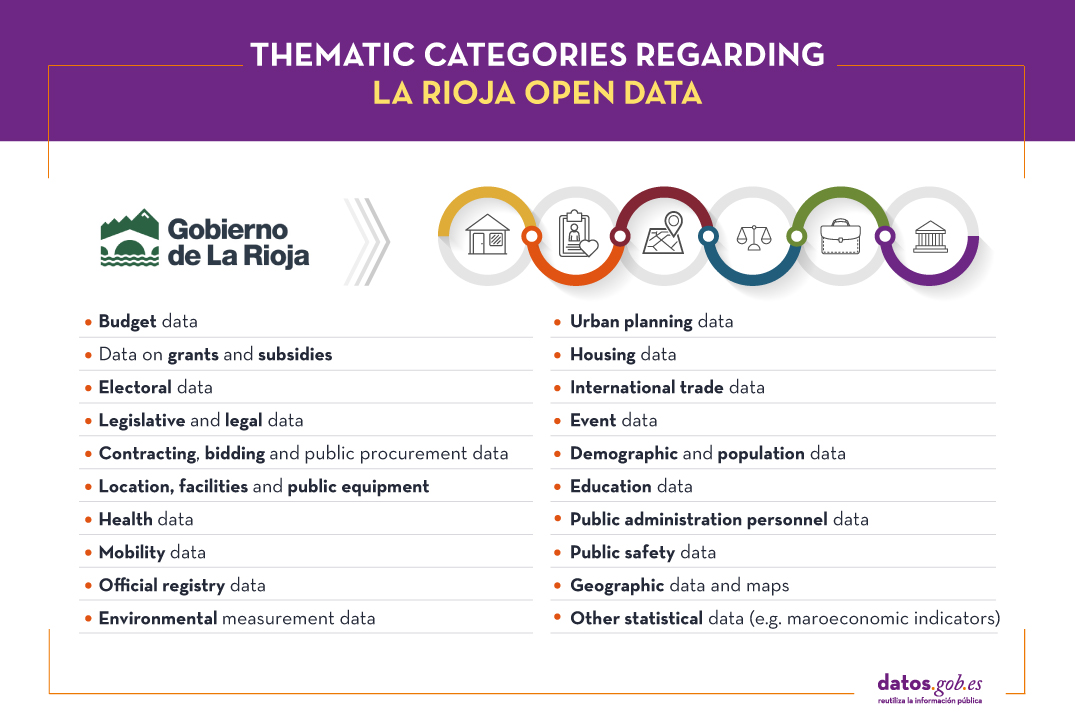
The attached document shows which international indicators have been used to define each category, as well as the resources to be opened related to each field. For example, in the case of health data, they have been inspired by the best practices of the Open Data Barometer and the ODRA (V3.1). The data proposed to be opened in this category are: activity data for certain services, everything related to COVID19 (number of antigen and PCR tests, number of cases, ICU places occupied, etc.), user satisfaction indicators, geocoded hospital and outpatient data, and basic health areas.
The selection, monitoring and evaluation of the published data and its associated metadata will be carried out by an internal Open Data Committee, soon to be created.
Improved interoperability
In La Rioja, they are aware that it is not enough to open data, but that it is necessary to do so according to requirements that facilitate its use. For this reason, they are working on a project for the semantic representation of information: the Semantic Platform of the Government of La Rioja.
Through this platform, public resources are classified into different subjects and represented by ontologies that will make it possible to have a standardized common frame of reference. The aim is to implement a system based on Tim Berners Lee's 5 stars, thus enabling data to be referenced among themselves (what we know as Linked Open Data).
For this work they use as reference dictionaries and thesauri such as EUROVOC and thematic classifications such as those provided by the Technical Standard for Interoperability (NTI).
Going a step further: the implementation of new technologies at the service of open data
In line with the National Artificial Intelligence Strategy (ENIA), La Rioja is promoting the use of AI for data-driven public management. They are currently immersed in a pilot where machine learning techniques are used for the interpretation of natural language. Thanks to this, they can automatically analyse metadata, extract entities and classify them thematically based on pre-established dictionaries.
Finally, it should be noted that among its future plans is also the approval of a law on Transparency, Good Governance and Open Data which, among other issues, regulates the opening of data.
With all these actions, La Rioja seeks great advances in integrating, unifying, publishing, linking and exploiting the information existing in the institution. This work is essential so that companies, individuals or the public administration itself can work with these data in a simpler way and extract all the value.
Discover which are the strategic frameworks that mark the publication and use of open data, as well as the most outstanding datasets at local, regional, national and international level through the various infographics that we will publish periodically.
1. European Health Data Space: objectives and approach
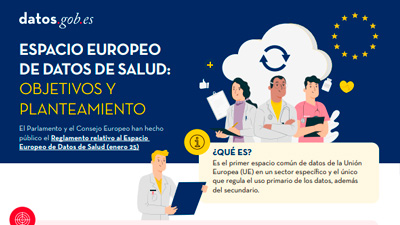 |
Published: February 2024 In this infographic we tell you the keys to the EU''s first common European data space in a specific sector and the only one that regulates primary, as well as secondary data use. Discover the areas of action, related projects and next steps. |
2. Data and its governance in the European Artificial Intelligence Regulation
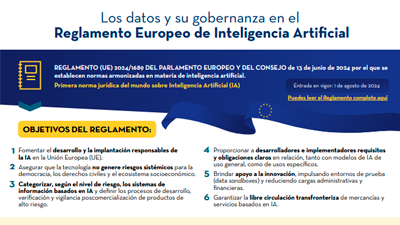 |
Published: October 2024 The European Regulation on Artificial Intelligence seeks to constitute a reference framework for the development of any system and to inspire codes of good practice, technical standards and certification schemes. In this infographic we tell you about its keys. |
3. Examples of open datasets published by local entities
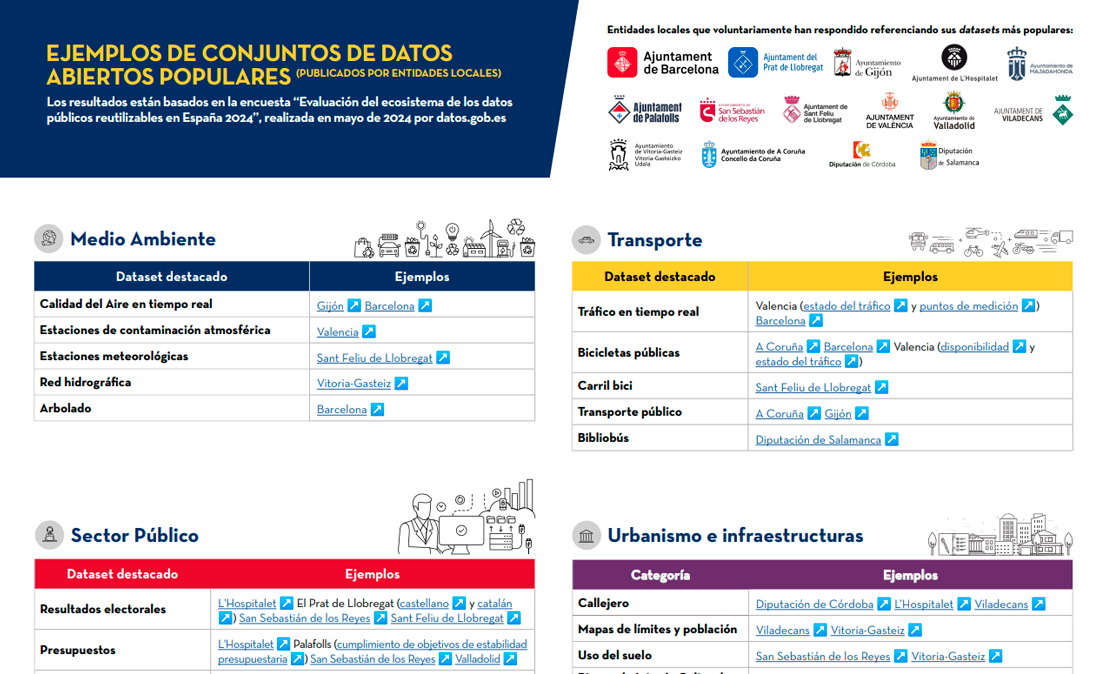 |
Published: September 2024 In order to learn about their open data activities, a survey was conducted last May in which representatives of local entities participated. This infographic collects examples of the most popular datasets from their portals. |
4. European Declaration on Digital Rights and Principles
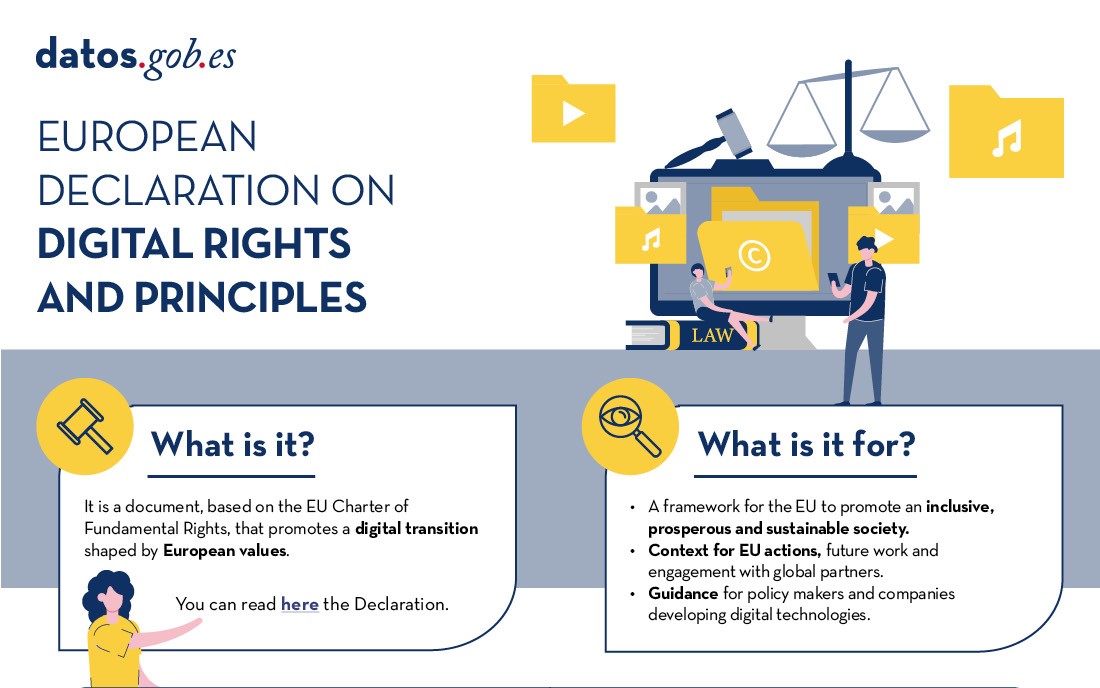 |
Published: August 2024 The Declaration is based on the EU Charter of Fundamental Rights, which promotes a digital transition shaped by European values. In this infographic, the principles that shape it and the opinion of European citizenship for each of them are presented. |
5. Artificial intelligence strategy 2024
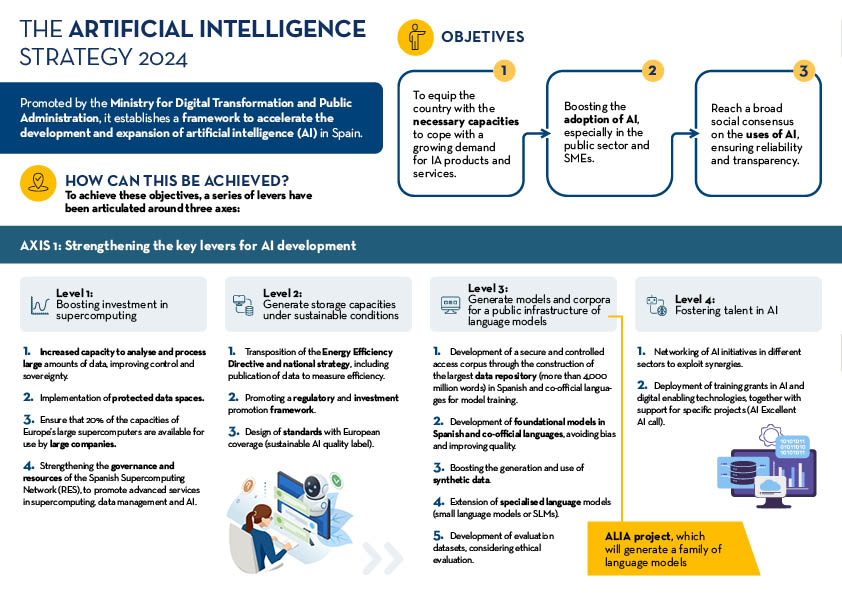 |
Published: July 2024 The new artificial intelligence strategy 2024 establishes a framework to accelerate the development and expansion of AI in Spain. It is articulated around three main axes developed through eight lines of action, which are detailed in this infographic. |
6.High value datasets
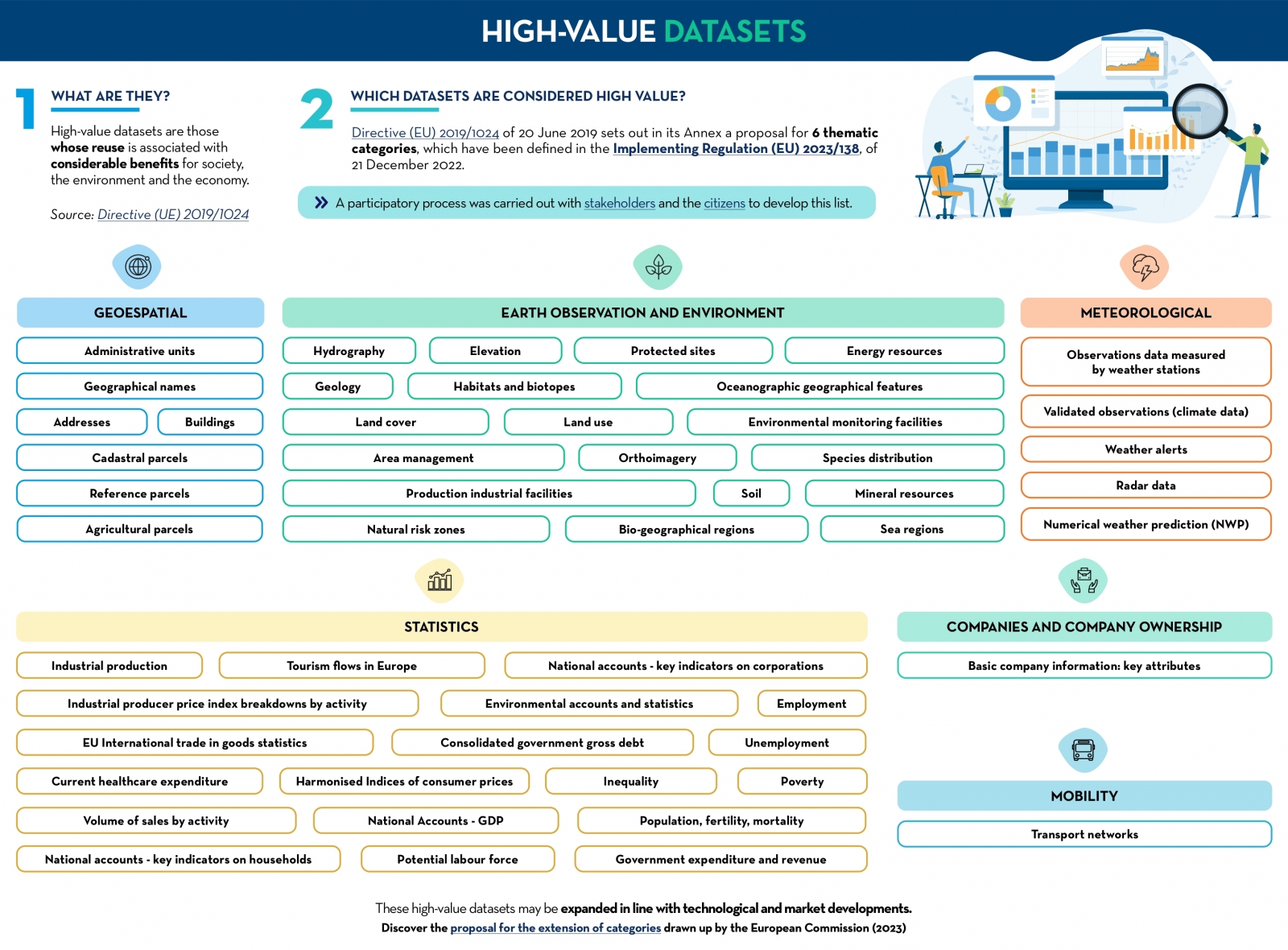 |
Published: March 2024 This infographic shows the high-value data categories defined in Implementing Regulation (EU) 2023/138 of 21 December 2022. Find out what these categories are and how the datasets linked to them should be published. A one-page version has also been created to facilitate printing: click here. |
7. Gaia-X and European data spaces
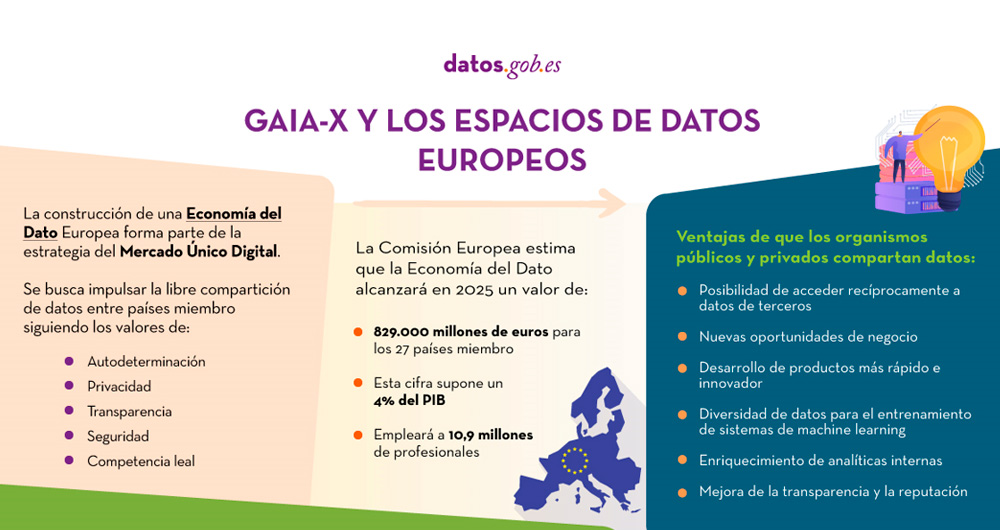 |
Published: April 2022 This infographic shows the context driving the development of data spaces, focusing on some related European initiatives such as Gaia-X and ISDA. |
8. Trends in open data around the world
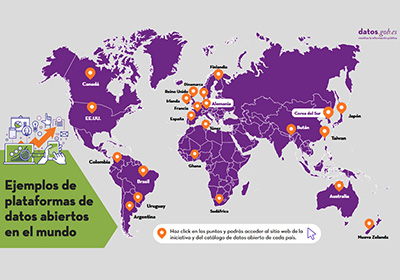 |
Published: Novembre 2021 Through this interactive infographic you can easily access the open data platforms and datasets of several leading countries. The infographic is accompanied by a post which briefly analyzes the strategies and next steps to be taken by these initiatives, showing what are the main trends worldwide. |
9. The most demanded datasets published by local entities
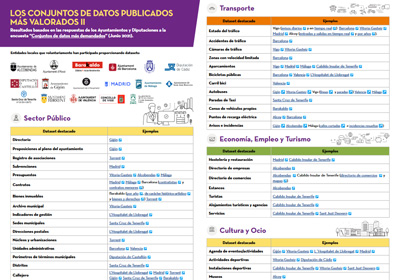 |
Published: July 2021 17 local entities, including city councils, provincial councils and an island council, share with the users of datos.gob.es which are their most demanded datasets, among all those published under standards that favour their reuse. The datasets are segmented by thematic categories, highlighting transport, environment and public sector data. |
10. The Open Government and Public Data Strategies of the Autonomous Communities
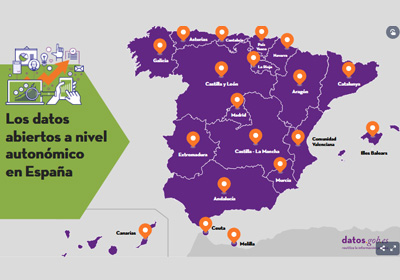 |
Published: June 2021 An interactive map shows the open data initiatives at regional level in Spain, including in each case the url to its portal and the main documents detailing its strategic framework. The infographic is accompanied by an article which addresses the commitments made by each Autonomous Region in the IV Open Government Plan of Spain. |
11. What are the most demanded datasets?
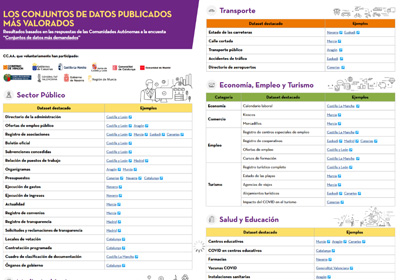 |
Published: May 2021 This infographic compiles some 100 datasets published by regional organizations, which are offered in open format according to standards that facilitate their reuse. The datasets are shown divided by thematic categories, highlighting those related to the public sector, the economy, employment and tourism, and the environment. |
12. The data-related strategies that will mark 2021
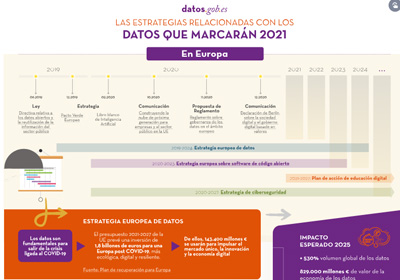 |
Published: January 2021 This interactive infographic shows the strategic, regulatory and political situation affecting the world of open data in Spain and Europe. It includes the main points of the European Data Strategy, the Regulation on Data Governance in Europe or the Spain Digital 2025 plan, among others. |
At the end of last year, the IV Open Government Plan for Spain was published, which included a series of commitments that public administrations undertook related to accountability, improved participation or open data and the reuse of public information, among other aspects. The objective: to contribute to a fairer, more peaceful and inclusive society.
In this article we will review the strategies linked to open data of the Autonomous Communities and the commitments made in this plan.
Andalusia
The Junta de Andalucía's open data portal has 4 objectives: Transparency; Innovation and economic growth; Efficiency and effectiveness of the administration; and Inclusion and empowerment of citizens. Its actions are framed within the Junta de Andalucía's Open Government Action Plan.
Its future plans are the implementation of formalised openness mechanisms, both technical and organisational. High-value datasets will be selected, common vocabularies will be defined and permanent contact will be established with the community of re-users to encourage re-use. Methodologies and processes for data-driven decision making will also be enabled, and a training plan on Open Government and open data will be carried out, especially targeting administration staff.
Asturias
The data catalogue of the Principality of Asturias is integrated in its Open Government area and its activity is framed within the Law of the Principality of Asturias 8/2018, of 14 September, on Transparency, Good Governance and Interest Groups.
The Asturian Government has committed, in the IV Open Government Plan, to the elaboration of the Strategic Transparency Plan of the Principality of Asturias (PETPA) with measures that contribute to the compliance with the Asturian Law 8/2018. This Plan will also include mechanisms for training, awareness-raising, participation, monitoring, control and evaluation in the field of Transparency.
Aragon
The Aragon Open Data Strategy focuses on two pillars. On the one hand, promoting interoperability, through the Interoperable Information Structure of Aragon EI2A. On the other hand, active listening, with actions such as Aragon Open Data Focus, aimed at getting to know publishers and users of open data better (more information in this interview). In their strategy they propose a model and a roadmap defining the mission, vision and values of Aragón Open Data:
- Mission: to be the catalogue from which citizens and companies can access the set of open data offered by the Government of Aragon and other institutions.
- Vision: to provide a treatment of information systems that not only generates wealth, but also develops and consolidates the infomediary sector to improve the social and economic development of the region.
- Values: quality, interoperability, participation, coordination, collaboration, transparency and accessibility.
Canary Islands
The Canary Islands have committed to centralising the public data of the different administrations of the islands in a single access point (called Canarias Datos abiertos), with the aim of improving the location and accessibility of the information, applying processes of standardisation of formats and ensuring interoperability, among other reasons.
Its commitments also include promoting participation, through a Canary Islands Open Government Network as a meeting point for the bodies of the Canary Islands Public Administration. All of this will be reflected in the Open Government Strategy for the Canarian Agenda for Sustainable Development 2030, recently presented.
Castilla y León
Castilla y León is a very active region in the open data ecosystem, with a special focus on dissemination and awareness-raising. It is currently running the fifth edition of its open data competition to promote the reuse of its datasets.
In the IV Open Government Plan, they are committed to approving a new law and drawing up a catalogue of public information, already approved, where the commitment of each organ, body and public entity of the regional public sector is materialised. The aim is to increase the volume of relevant, clear and structured public information to be actively disseminated.
Castilla y León is drafting the new Law on Transparency, access to public information and its reuse, which includes the so-called "Open Data clause": any IT development, whether carried out with its own or external resources, must facilitate the extraction of the information collected, recorded or collected in reusable formats.
Castilla - La Macha
The "Open Data of Castilla-La Mancha" space is the result of Law 4/2016, of 15 December, on Transparency and Good Governance of Castilla-La Mancha. Castilla-La Mancha's strategy has focused on constant openness and training. Since 2017, a Training Plan has been approved which includes specific courses on open data and reuse of information aimed at public employees. In addition, through a collaboration agreement with the University of Castilla-La Mancha, the Specialisation Course in Open Government (previously called Transparency and Access to Public Information) is being developed, which includes, among others, the subjects of access, open data and reuse of public information.
Among the objectives to be addressed in the coming months is the development of an improvement plan for its Open Data space, which will include advances in the visualisation of information, the incorporation of high-value data and data governance, among other issues.
Cantabria
Cantabria does not have a centralised open data portal for the whole territory, although we can find the ICANE (Cantabrian Institute of Statistics) open data space focused on the opening and reuse of statistical data. They also offer the possibility of downloading cartographies and geographic information from their geographic viewer.
In the 4th Open Government Plan, they have focused on the area of citizen participation, committing themselves to drafting a new law that establishes the material channels and provides information and knowledge to citizens, with the aim of motivating their participation. Until now, the regulatory framework in this area has been marked by Law 1/2018, of 21 March, on Transparency in Public Activity.
Catalonia
The Government of Catalonia is committed to citizen participation. Its open data strategy has been closely linked to contact with society and the business world, through different actions such as the "Café amb Dades" information sessions.
In the IV Open Government Plan, they committed to creating a virtual meeting place for all the actors working in the field of citizen participation: ParticipaCatalunya.cat, which is already operational. They also plan to build a space for citizen participation to supervise the Generalitat's anti-corruption strategy, as well as to prioritise the opening of public information related to gender inequality, in order to facilitate the monitoring and evaluation of the impact of public policies on equality. For the time being, they are working under the umbrella of their Open Government Plan 2019-2020, which was extended last year.
Extremadura
Within the area of citizen participation and transparency of the Regional Government of Extremadura we find its catalogue of publications, the result of the law 4/2013, of 21 May, on Open Government of Extremadura, which guarantees the right of access to public information. Its strategy also includes the Digital Modernisation Plan 2020-2024 of the Regional Government of Extremadura, which includes, among its priorities, data orientation, promoting its cataloguing and reuse by proactively facilitating its accessibility and usability. Likewise, transparency is one of the ten principles that should guide the performance of the plan and, ultimately, the functioning of the Administration in this scenario of Digital Transformation.
Extremadura's commitments in the IV Open Government Plan are related to the simplification of the right of access to public information and the reduction of response times to the interested party's request, as well as to increasing the level of citizen satisfaction in access to public services, promoting their accessibility and usability through the redesign of processes.
Galicia
In the strategy of the Open Data initiative of Galicia, Abert@s, the importance of internal dissemination stands out, encouraging the participation of all areas in the publication of data, and the promotion of reuse. Its actions are carried out under the umbrella of Law 1/2016, of 18 January, on transparency and good governance.
Galicia's commitments in the IV Open Government Plan are related to improving the Galician government's decision-making, enhancing citizen participation and the automation of administrative procedures, as well as boosting accessibility in the Xunta de Galicia's Transparency and Open Government Portal. They also want to improve the quality of information and promote the publication of content in reusable formats, among others.
Balearic Islands
The regulatory framework for Open Data in the Balearic Islands is Law 4/2011, of 31 March, on good administration and good government in the Balearic Islands, although the agreement that gave rise to its open data portal dates from a month earlier.
The Gobern's commitments on open government have mainly to do with training and regulation. On the one hand, they will carry out training activities aimed at public employees on open government, including open data. On the other hand, they will approve a new Transparency Law and a decree determining the organisation of transparency. The IV Open Government Plan includes more commitments, such as the creation of a platform for citizen participation and the development of an evaluability study to include monitoring indicators in public policies.
La Rioja
The open data portal of La Rioja responds to 2 laws: Law 3/2014, of 11 September, on Transparency and Good Governance of La Rioja and Decree 19/2013, of 31 May, which regulates the reuse of information in the Public Sector of the Autonomous Community of La Rioja.
Those responsible have committed to improving access to information on this portal, as well as on the Transparency Portal and the institutional website. The aim is to integrate, unify, publish, link and exploit the existing information in all of them, in a more efficient way. The development of a new website that is simpler, smarter and more efficient in terms of locating and reusing content will be promoted. Actions will also be developed to improve active publicity and the evaluation of the results of the plans and programmes.
Community of Madrid
The data portal of the Community of Madrid was launched in 2019, the same year as its Law 10/2019, of 10 April, on Transparency and Participation of the Community of Madrid. Since then, its portal has continued to grow, incorporating new datasets and sections aimed at reusers.
In the IV Open Government Plan, the Regional Government of Madrid highlights the importance of communication. It is committed to providing citizens with information in a simple, clear and effective way, so that they can interact more easily with the administration. As a background, they have already worked on a Clear Communication Guide that they want to extend to the field of transparency and citizen information.
Region of Murcia
The CARM has had an open data portal since 2014 and an open data strategy since 2016, which sets as one of its objectives the generation of value through the use of open data. The Regional Administration has included this policy in its Transparency and Open Government Portal, with the aim of aligning both strategies.
The commitments made by the CARM in the IV Open Government Plan are more closely linked to its Public Governance Strategy. Among the measures to be promoted is the creation of a framework for Institutional Integrity, including codes of conduct and training, dissemination and promotion actions, among others, as well as a Register of Interest Groups. Child and youth participation in the design of public policies will also be promoted through workshops.
Navarre
The open data portal of Navarre responds to the Foral Law 5/2018, of 17 May, on Transparency, Access to Public Information and Good Governance. Work is currently being carried out on the integration of geographical data, which can be found in the Spatial Data Infrastructure of Navarre, and on the integration of a greater number of local entities.
Navarre wants to promote the use of open data on its portal, and therefore undertakes to publish datasets that are of greater interest for the reuse of public sector information and to improve the design and content of the Open Data space. It will incorporate data generated by (NA)SAT and will collaborate with the infomediary sector to identify data of greater interest. Among its objectives is also the federation of Open Data Navarra with broader open data catalogues, such as datos.gob.es.
Valencian Community
The opening and reuse of data is one of the strategic lines included in the Generalitat Valenciana's Biennial Transparency Plan. Although its open data portal dates back to 2016, a new version was launched in 2020, with a change of conception: they have gone from a data repository to a space open to the community of reusers.
In the coming months, Valencia will develop and implement an open data strategy in Valencian public administrations so that the data generated are open and reusable by default. The aim is to promote reuse, accountability and data-driven decision-making, among others. The Generalitat is also promoting instruments for better data management, such as the Artificial Intelligence Strategy for the Valencian Region, and is committed to a collaborative budgeting project, as well as to institutionalising public ethics.
Basque Country
The Open Data Euskadi portal was a pioneer in our country, dating back to 2009. The promotion of open data and the encouragement of its reuse is the responsibility of the Directorate for Citizen Services and Digital Services, as stated in its structural decree. Some of its latest projects are the new Euskalmet website, created with open data, the creation of various open data APIs (traffic, cultural events, etc.) and its Open Data Competitions.
Its commitment is to work together with the main Basque administrations to identify sets of data demanded by the group of reusers in the Basque Country and by citizens, and to standardise and link this data, developing inter-institutional visualisations and services. All of this is accompanied by a participation and communication plan in terms of social auditing, as set out in its Action Plan for Open Government in the Basque Country 2021-2024.
Ceuta and Melilla
The autonomous cities of Ceuta and Melilla, although they do not have open portals yet, have also included commitments in the plan. Ceuta is committed to launching a transparency portal and developing regulations in this area, among other issues. Melilla, for its part, has focused on training and will carry out programmes on youth participation in public management.
In short, all the administrations are working to continue promoting access to information, citizen participation and the reuse of public data.
The IV Open Government Plan 2020-2024 represents a new step in the achievement of the Sustainable Development Goals promoted by the United Nations within the framework of the 2030 Agenda adopted by its General Assembly. Specifically, for the achievement of number 16, related to Peace, Justice and Strong Institutions.
The Plan was approved in October 2020 by agreement of the Plenary of the Open Government Forum, a collegiate body attached to the General State Administration. This body has the participation of other Administrations and civil society which, on the other hand, have played an important role in its preparation process. In this regard, it should be noted that, in line with the principles of Open Government, the Plan was drawn up on the basis of a process of open consultation with society, in which almost 70% of the comments referred to transparency, accountability and open data.
Among the main challenges, the IV Plan raises the need to strengthen transparency, public access to information and accountability. To this end, the firm commitment to promote open data and the reuse of public sector information is of particular importance, especially with regard to the possibilities of promoting preventive systems of public integrity and, specifically, in the area of public sector procurement. This is undoubtedly a commitment that entails a relevant cultural and organizational change that inexcusably requires training actions both for the staff of Public Administrations and for society in general.
The Open Government Plan and the reuse of public sector information
The Plan includes the main commitments in this area in order to "contribute to a more just, peaceful and inclusive society". In the specific case of transparency, open data and accountability, the Plan indicates that they will be promoted "through the development of actions aimed at their improvement and the evaluation of the results of public plans and programs", which necessarily entails a modification of the current regulations on transparency, access to information, open data and reuse of public sector information.
Specifically, the transposition of the new features incorporated in Directive (EU) 2019/1024 of the European Parliament and of the Council, of June 20, 2019, is contemplated as a first step. In this regard, it is considered that such reform may have a high transformative and fostering impact on the data ecosystem in that it requires extending the scope of the current regulatory framework. As regards the material execution of this commitment, the starting date is July 2020 -when a public consultation was opened prior to the preparation of the corresponding Preliminary Draft Bill- and the end date is July 17, 2021, when the new state legislation should have been definitively approved.
Main commitments of the IV Open Government Plan 2020-2024
In the process of preparing the Plan, special attention was paid to the contributions of the different public and private entities that form part of the Open Government Forum through their participation in various meetings and working groups, in addition to the aforementioned open consultation process with civil society.
During the process of preparing the Plan, the public administrations themselves included contributions of special interest. These are commitments that have been made and are included as proposals for improvement in the Plan itself. Apart from the promotion of the aforementioned general regulations, from the point of view of the initiatives promoted by state public entities, proposals were presented that were certainly relevant. These include the National Institute of Public Administration's data on the selection and training of civil servants, the implementation of a Climate Open Data by AEMET, the dissemination in open formats of the information of the Spanish Tourism Quality System, the promotion of an ecosystem of open geographic data and services, as well as the opening of data from the Commercial Registry.
With regard to the initiatives proposed by the Autonomous Communities, the following commitments stand out:
- At the regulatory level, of particular relevance is the commitment of the Junta de Castilla y León to approve a new legislation on transparency, access and reuse of public information, the processing of which is underway with the drafting of a preliminary draft already submitted to the corresponding hearing process.
- With regard to specific training on open data, the implementation of a specific training plan on open data aimed at the staff of the Junta de Andalucía within the framework of a broader plan that also includes the promotion of big data is noteworthy.
- The commitment to its own governance model is also present in the development of an open data strategy to promote the reuse of information in the Valencian public sector.
- With the aim of improving the conditions of access to information, the Canary Islands government is considering the implementation of a single centralized portal for access to open data, an approach that is also present in the evolution towards a single data catalog in Navarra.
- Finally, as regards the promotion of open data in some sectorial areas of special relevance, the Catalan Government intends to promote open data linked to gender equality policies.
In short, this new Plan updates and specifies the roadmap for the public sector in Spain with regard to the promotion of open data and the reuse of public sector information. This is a topic of special importance during the year 2021 for the promotion of Open Government from a legal perspective, given the need to approve a new state legislative framework and, likewise, the foreseeable adoption of other regulatory initiatives at European level
Content prepared by Julián Valero, professor at the University of Murcia and Coordinator of the Research Group "Innovation, Law and Technology" (iDerTec).
Contents and points of view expressed in this publication are the exclusive responsibility of its author.
After analyzing the European framework that will shape the world of data in 2021, it is time to focus on our country. The Spanish strategy linked to the world of data is aligned with the European one. As we will see below, a large part of the European measures have been included in the national strategies.
At the end of 2020, two major strategic plans were presented that mark the lines to be followed this year: the Digital Spain Plan 2025 and the IV Open Government Plan of Spain 2020-2024.
Digital Spain Plan 2025
The Digital Agenda for 2025, presented in November, includes among its strategic axes “moving towards a data economy, guaranteeing security and privacy and taking advantage of the opportunities offered by Artificial Intelligence with the objective that, at least, 25% of companies use Artificial Intelligence and Big Data within five years. ”
Among its measurements are:
• The implementation of a National Artificial Intelligence Strategy. This strategy, which was already published in December of last year, includes a series of measures related to the availability of open data, an essential component for the proper functioning and training of Artificial Intelligence systems. Some of these measures are the development of accessible repositories, the provision of assistance to companies in defining open or shared data strategies, or the creation of a multidisciplinary open data working group in the state public sector. It should be noted that in 2019 the Ministry of Science and Innovation published the Spanish R & D & I Strategy in Artificial Intelligence, which highlighted the role of datos.gob.es in making open data available to citizens and had an impact in the need to establish mechanisms so that the administration can safely and ethically exploit the data generated by other administrations and even by private companies, all with the aim of improving public services, guaranteeing social welfare and individual and public safety .
• Creation of a data office. This body, which will have a Chief Data Officer (CDO) in charge, will be in charge of designing and proposing strategies that make public data of the Administrations available to companies and citizens. Among other functions, it will have to establish the necessary measures to promote the sharing and use of public and private data, create environments to safely share data between companies and public administrations in an aligned and coordinated way, invest in the generation of "lakes sectoral data” and propose governance mechanisms.
- Among its ten points, the Digital Spain Plan 2025 includes the impulse of the digitization of Public Administration with the aim of improving its efficiency and effectiveness. In this sense, the Digitalization Plan of Public Administrations 2021 -2025 has been made public, which highlights, among other issues, the intention to evolve the model of access to public and private information to facilitate the development of high-quality services. added value, based on the work carried out by the Aporta Initiative.
• Promotion of shared data spaces. Spain will play an active role in the European strategy "European Cloud Federation". Work will be done to promote private investments in Data Centers and an Iberian space will be promoted, together with Portugal, to promote the development of advanced data computing technologies.
The plan also includes the need to digitize specific areas of the administrations to reinforce their effectiveness and efficiency. Among other issues, a public administration based on secure data will be promoted. The provision of information with an “Open Data” orientation will be promoted, as well as the analysis of consolidated data, or the automation of processes, always with a special focus on data protection. A secure framework for the interconnection and management of data in the field of public health will also be developed.
IV Open Government Plan of Spain 2020-2024
The IV Open Government Plan of Spain 2020-2024 includes 10 commitments assumed by public administrations to “reinforce transparency and accountability, improve participation, establish systems of public integrity, and train and sensitize citizens and staff public employee in matters of Open Government .”
The plan includes different measures related to open data and the reuse of public data, such as:
• The transposition of Directive (EU) 2019/1024 on open data and the reuse of public sector information into the Spanish legal system to provide the necessary legal coverage that would make it possible to expand the scope and scope of reuse. The deadline for adaptation to our regulatory framework ends in June of this year.
• The reform of the law on transparency, access to information and good governance to facilitate compliance with the obligations of active publicity and favor the exercise of the right of access to information.
• Improving the provision of real-time access to dynamic data through appropriate technical means, increasing the provision of valuable public data for reuse.
• The promotion of data sets with high reuse value, through their selection, the definition of common vocabularies and their publication. Likewise, permanent contact will be established with the community of reusers to promote the use and improve the catalog, as well as with the business community and civil society to facilitate access to public information.
Based on these two major strategic plans, the national lines of action in the field of open data will be articulated, which will also be included in the Digital Rights Charter that will be released in 2021 - after an open consultation process -. This letter will guarantee the right of access to public information, and it is indicated that public administrations will be governed by the principle of transparency and data reuse.

You can see a summary of the strategies related to the data that will mark 2021 in Europe and Spain in this link.
As a new year begins, it is time to take a look at the strategic, regulatory and political situation that will affect the world of open data in the coming months.
In this article we will focus on the situation in Europe. If you want to know the Spanish framework, you can read the article " The data strategies that will shape 2021 in Spain".
Europe stresses importance of data to drive recovery and innovation
After a 2020 marked by the global pandemic, 2021 is expected to be the year in which both health and economic recovery begins. In this sense, the European Commission considers data as a fundamental asset to overcome the crisis linked to COVID-19, and will therefore continue to promote its openness and reuse.
Already at the end of 2019, with the presentation of the European Green Deal, the Commission set out the roadmap to follow based on two pillars: digitisation and environmental sustainability. Among other issues, the Green Deal highlights the need to promote accessible and interoperable data, which, combined with digital infrastructure (supercomputers, cloud storage, ultrafast networks) and artificial intelligence solutions, facilitate informed decision-making.
Along the same lines is the white paper on Artificial Intelligence, published in February 2020 with the aim of ensuring an AI ecosystem of excellence and trust, based on regulation and investment. Among other issues, the document emphasises the need to ensure access to reusable data in accordance with the FAIR principles. This data must be comprehensive and representative in order to train AI systems and ensure their reliability.
Objectives and lines of action for 2021
The Commission's objectives for 2021 include boosting Europe's digital sovereignty, i.e. improving its competitiveness beyond its borders. To this end, it has established a European data strategy to drive the data economy and a digital single market, where data is shared between member states. This strategy will be accompanied by considerable investment, as the Recovery Plan for Europe, designed to help repair the economic and social damage caused by the pandemic, indicates that €143.4 billion will be allocated to the "Single Market, Innovation and Digital Economy".
This European data strategy is based on:
- A multi-sectoral data use and access governance framework. The proposal for a regulation of the European Parliament and of the Council on European data governance, published at the end of 2020. This regulation establishes a legally binding framework that provides mechanisms for the re-use of public sector data that usually cannot be exploited due to third party rights or personal data protection. The regulation facilitates the transfer of personal and business data for the common good, establishes the figure of neutral data sharing service providers, and obliges states to establish a single point of information, among other issues. This regulatory proposal is accompanied by an impact assessment that analyses the possible policies to be implemented in this area on the basis of their effectiveness, efficiency, coherence and legal and political feasibility. It states that "the general public is in favour of a comprehensive data strategy and the altruistic transfer of data, as well as the implementation of technical tools that allow citizens to actively participate in the data economy".
- This regulation complements the Directive on open data and re-use of public sector information, which extended the scope of Directive 2003/98/EC and its 2013 reform. During the first quarter of 2021, the implementing act on high-value databases, the re-use of which is associated with considerable benefits for society, the environment and the economy, is expected to be adopted, as set out in this directive.
- Boosting public-private collaboration and investments in data, capabilities and infrastructure, with a focus on data storage, cloud, 5G and interoperability. In this regard, one of the commission's major projects is the pan-European cloud federation. On 15 October, the relevant ministers made a joint declaration called 'Building the next generation cloud for businesses and the public sector in the EU' to combine private, national and EU investment in the deployment of competitive, green and secure cloud infrastructure and services. The main focus is on the deployment of European data spaces in sensitive areas such as health, industry or the environment to help overcome technical and legal obstacles. A first initiative in this field is GaiaX.
- The empowerment of people, and investment in SMEs and their training, through actions such as the new Connecting Europe Facility (CEF) grants or the Digital Education Action Plan (2021-2027), which among other actions proposes the development of ethical guidelines on artificial intelligence (AI) and the use of data. It also updates the European Digital Skills Framework, including AI and data-related skills, and support for the development of learning resources for schools.
Finally, other plans and strategies related more generally to data have also been approved during 2020, such as the European Strategy on Open Source Software 2020-2023, the Cybersecurity Strategy or the Berlin Declaration on the digital society and value-based digital governance.
With all these measures, the European Commission seeks to make data one of its priority axes, a valuable asset, which should be reusable, accessible with guarantees and serve as a basis for numerous economic and social activities.

If you want to know how these strategies, plans and regulations are reflected in Spain, we invite you to read the article " The data strategies that will shape 2021 in Spain".
You can see a summary of the data-related strategies that will mark 2021 in Europe and Spain in this link .
